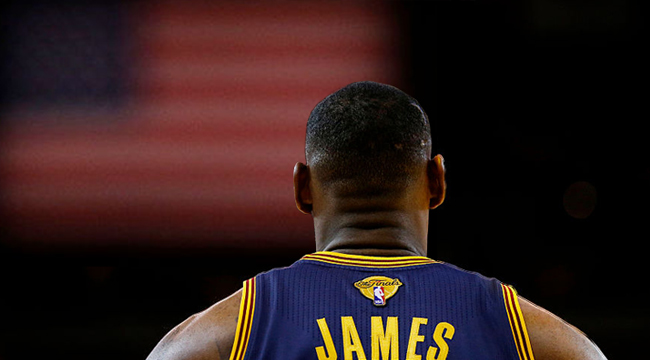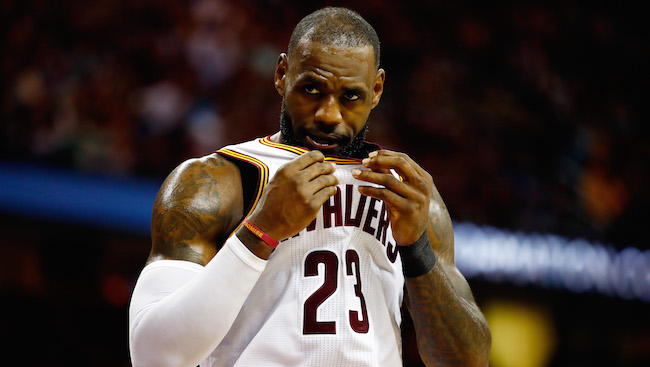
Lebron James has earned $595 million dollars between his salary, endorsements, and a continuing one-billion-dollar contract with Nike. The world will likely hold off his deserved title of “best basketball player in the world” until he decides to retire, but most people already acknowledge that. Yet, despite all that, there’s one label that LeBron James will never shed in the eyes of some folks in this country no matter how rich he gets: N*gger.
If you somehow missed the news, late Tuesday night (early Wednesday morning) someone decided to spray paint the word “n*gger” on the front gate of LeBron’s Brentwood home in Los Angeles. Make that, his Brentwood mansion. Racist vandalism on the front porch or gate or lawn of a black residence is an ugly and all too familiar chapter of America’s racist past, and clearly, its present.
This time the perpetrators used spray paint to remind James that no matter his paycheck, no matter his skill level, American racism will always pop up to assert his lower racial status, because of his blackness. It wasn’t quite a burning cross, but it’s damned close.
There is a certain irony that James’ house in the Brentwood is in the same neighborhood that OJ Simpson lived while spending years attempting to run away from the realities of his race. LeBron, on the other hand, confronted it directly.
James responded to the incident with this statement: “Racism will always be a part of this world, a part of America. And you know hate in America, especially for African-Americans, is living every day. Even though it’s concealed most of the time, even though people hide their faces and will say things about you and when they see you they smile in your face, it’s life every single day.”
With that, LeBron defined what it is to be black in this country: To face small microaggressions on a daily basis – no matter how wealthy or famous you are – and be asked by those who lack your experience if you could kindly not lose your mind, lest everyone think you are the one with the problem.
Beyond his own pain, James also brings up the plight of black parents in America.
“The most unfortunate part,” he said. “[Is] that I’m here right now and I can’t see my boys. But I can’t sit in front of my boys right now and I won’t be home until next week, so this is killing me inside.”
LeBron referenced a depressing rite of passage for every black parent in America: educating their children on the racism embedded in this country. It is insane to consider that the greatest basketball player in the world couldn’t even focus his mind on his job, the day before one of the biggest tests in his career, because some random dude decided to engage in a racist act against his family.
What LeBron would likely tell you is that he’s not alone in this. Kids of color are stripped of their innocence early on, informed at an early age that racism will define and shape their life in ways that are completely out of their control. They are told no, it will likely not get better, and in most cases for your safety, no you cannot retaliate. Black children are told this out of protection, because not knowing the rules is not an option, either.
“I think back to Emmett Till’s mother actually,” James said later. “It’s one of the things I first thought of and the reason she had an open casket is because she wanted to show the world what her son went through as far as a hate crime and being black in America.”
Similar to Till’s lynching in 1955 was a case in the Greenwood section of Tulsa, Oklahoma, in 1921, when a black man was accused of raping a white female elevator operator. The ensuing race riot left over 300 dead, 800 injured, and over one and a half million dollars in property damage in just 48 hours. Like the lynching of Emmett Till, the incident involved a black man and a white woman. Even today, societal fear of black men around white women hasn’t subsided, and exposes the same sort of racism that permeated culture during the days of slavery.
The riot was stricken from the local and national history books until the 75th anniversary of the event in 1996, when Oklahoma state legislature commissioned a study on the event. The most jarring part is this event happened exactly 96 years ago to the day of the hate crime against LeBron, and is historically known as one of the worst race riots in American history.
While many things have changed in some aspects over the past 96 years, other things have stayed exactly the same.
“No matter how much money you have, no matter how famous you are, no matter how many people admire you, being black in America is tough,” James says. “And we’ve got a long way to go for us as a society and for us as African-Americans until we feel equal in America.”

Quite frankly what does it say about America as a country if a $21 million dollar home — in one of the most exclusive and secure parts of the country no less — can’t provide the greatest basketball player of his generation a respite from racism? It’s a stark reminder that no matter how much someone embodies the pull-yourself-up-by-the-bootstraps American dream like LeBron has, there’s a limit to how much you can celebrate it.
LeBron won’t ever be able to dribble past or hurdle over racism, hell, he can’t even outspend it. It’s too big and too fast for even him on the court of life. But if LeBron can’t do it, what does it say for the rest of us, and what chance do we have?
“But I look at it like this,” James said. “If this is to shed a light and keep the conversation going, then I’m okay with it. My family is safe, at the end of the day, that’s most important.”
As long as his family is safe, LeBron is willing to be the one shining a light on some of America’s darkest moments. It’s yet another reminder that LeBron is not only the athlete all children need to model themselves after, but most adults as well. Let’s hope the conversation he started on the day before Game 1 of the NBA Finals holds a lot more power than a hate-filled word spray painted on a gate.






